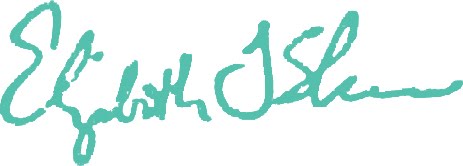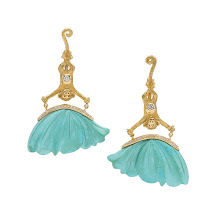 |
Graphic above and copy below is from the current edition of EO/Entrepreneurs' Organization's Octane Magazine. |
I have had my own jewelry line since my early 20s, when I quit my job to follow my passion. It wound up being one of the best decisions of my life, launching a career that has supported me, introduced me to a wonderful cast of characters and stretched my brain in ways I never could have anticipated. Now, after almost 20 years in the business, I’ve decided to take a bold step and change everything. I’ve decided to hit the reset button by clearing out my inventory and taking a creative sabbatical to figure out what’s next.
 |
| The idea for my business came to me while on a trip to the Bahamas in 1996 while in these beautiful waters. I returned there this summer during my creative sabbatical to recharge. |
My break from the business started with dissolving ties with my brick-and-mortar retailers. Once the lifeblood of my profession, selling in stores has changed so dramatically, it’s as if it has transformed into another type of business altogether. Many Octane readers will know what I mean: the increased competition; the customers’ prerogative to explore endless comparisons; the demands retailers place on you to ensure your inventory sells, all while existing under the unspoken threat of being replaced. And I’ve been one of the lucky ones!
While severing my brick-and-mortar ties proved challenging, the next steps were more difficult. Over the course of several months, I have rolled out massive sales on practically every piece of jewelry I’ve ever made.
I knew that breaking with the past also meant getting rid of baggage I had been holding on to for too long. I needed to get back to the place where all I had was passion and a purpose. Now, several months later, that is just what I have done, and I’m looking back at all of it with a clear perspective. In the spirit of 20/20 hindsight, here are some of the biggest lessons I’ve learned throughout my journey:
Do something with every single contact you get! I can’t tell you how many business cards I’ve let pile up without ever reaching out. Take action immediately when you meet someone. Send an email, set up a coffee date, write a “thank you” note, etc. My network would be so much larger if I had taken this advice earlier in my career.
In a non-threatening (and hopefully fun) way, shadow
your employees to see how they do their jobs. When I’ve
done this, I’ve discovered efficiency improvements that increased
productivity by as much as 30-40%. Sometimes it’s as simple as
getting a feel for how team members operate and spend their time,
and then making subtle tweaks to their routines.
Establish a daily group huddle, even if it’s just for five
minutes. I realize there’s a growing trend against meetings that
distract employees without increasing output, but I’ve found that
short huddles (instead of drawn-out meetings) can boost morale
and serve as a reminder that everyone is on the same team,
working toward common goals. Plus, it helps everyone—including
myself—to get a daily check-in for the sake of accountability, and
to introduce the potential for collaboration and fresh ideas.
Trust your gut first. It’s important to reach out for help, but it’s
even more important to trust yourself. I’ve spent close to a million
dollars on consultants over the years. Many of them I hired just to
validate what I already knew. Most of the time, I could have just
listened to myself.
Tune in to your financials weekly, if not daily. An intimate
understanding of the bottom line clarifies every decision you
make. It can be tempting to be a people-pleaser to the detriment
of your financial health; for instance, offering raises you can’t
afford or scrambling to purchase things that employees request
but don’t necessarily need. It’s the same for customers. Early on, I
remember thinking, “No problem, we can absorb this US$25,000
chargeback off the entire sale because we’ll get this incredible
marketing and promotion in the process. We’ll make it up in all
of the future sales we’ll get.” And then I was left with no profit,
clambering to find money to pay the company’s obligations. Being
ever-mindful of the financials makes all the difference in the world
when faced with choices like that one.
When working with investors, be as clear as possible
regarding how you plan to use the investment money
before spending a dime. In fact, I recommend putting it in
writing, with the understanding that the plan is a set of ideas
and intentions, not a strict contract (which should be handled
separately, of course). The idea isn’t to nail you down but to start
these important relationships with as much mutual understanding
and transparency as you can. Cultivating a climate of harmony
with investors is itself an art, one from which every business owner
would benefit.
Let mistakes lead to insights, not fits. It’s so easy to freak out
in the moment when things go awry, even over little things. But
when you remain calm and absorb the hits as they come, you give
yourself an opportunity to learn. I’ve stopped believing in the words “mistake” and “failure,” as people commonly use them. Obstacles and unexpected outcomes light the path to truth about your business and where to take it next, and truth about your strengths and where your energy is best focused.
Make room for yourself so you can get into “the zone.”
The workday is packed with opportunities to self-distract and self-destruct. We all struggle with getting out of our own way. When you tune in, you can become aware of the ways you lose focus and prevent yourself from entering the zone. Change your work environment and work style to make it easier to operate distraction free, even if it means leaving the office to get away from your team for a while. I can only go into the zone when I create the space for it. It’s a challenge, but the rewards are huge once I get there.
I could go on and on— about getting enough sleep, listening to your customers, the importance of meditation … about a million other things that occur to me every day. I’m still learning, that’s for sure. The lesson of the moment, however, is a big one: Learn to let go of those parts of the past that don’t serve you and move forward carrying all of your hard-won knowledge by your side.
Click here for a direct link to this article on EO Octane's blog.
Click here for a direct link to this article on EO Octane's blog.











